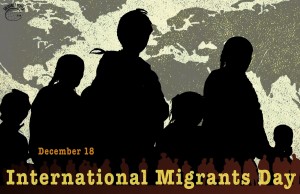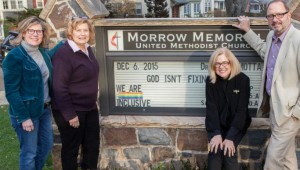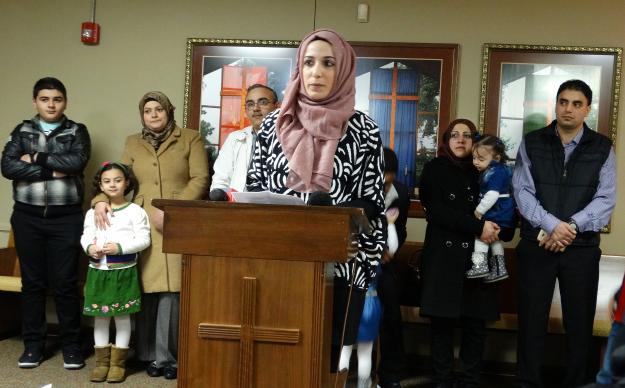This Friday, Dec. 18, many people will recognize International Migrants Day. And on Thursday, Dec. 10, many observed International Human Rights Day. These observances, although barely known to most, are significant and timely in light of the refugee and migrant crises happening right now in our world and impacting our nation.
 United Methodists in the U.S. and Europe especially are wrestling with the dilemma between their fears of terrorism and their faithful commitment to love their neighbors seeking to come ashore as refugees and migrants from afar. Their dilemma is heightened by the shrill, draconian calls by some to bar admittance of any persons of the Muslim faith into the U.S., a national policy that would be un-Christian, unconstitutional and undoubtedly destructive to our loving, cooperative relations with Muslim sisters and brothers here and abroad.
United Methodists in the U.S. and Europe especially are wrestling with the dilemma between their fears of terrorism and their faithful commitment to love their neighbors seeking to come ashore as refugees and migrants from afar. Their dilemma is heightened by the shrill, draconian calls by some to bar admittance of any persons of the Muslim faith into the U.S., a national policy that would be un-Christian, unconstitutional and undoubtedly destructive to our loving, cooperative relations with Muslim sisters and brothers here and abroad.
Bishop Peggy Johnson writes about our call to show compassion and hospitality to Syrian refugees, these suffering sojourners, in her latest Bishop’s Blog post, titled “From Horror to Hope.” A number of conscientious Eastern PA Conference pastors–and perhaps some lay members too–are likewise expressing similar convictions, with strong Gospel references, in newsletter columns, correspondences and sermons.
The Rev. J. Timothy Fisher, pastor of Chapman Quarries and Bushkill UM churches, offers the following view:
In the account of Jesus’ birth from Matthew’s Gospel, chapter 2, is recorded an incident no other tells: After the Magi/Wise Men from the East went back “to their own country by another way,” Herod the Great, furious that they had not returned to tell him what they had discovered, “sent and killed all the male children in Bethlehem and in all that region who were two years old or under,” figuring this slaughter would surely kill any rival to his throne and kingdom.
“Then was fulfilled what was spoken by the prophet Jeremiah: ‘A voice was heard in Ramah, weeping and loud lamentation, Rachel weeping for her children.; she refused to be comforted, because they are no more.’”
Surely these are some of the saddest words in the New Testament, aside from those about the Passion of our Lord. Joseph, though, had been warned in a dream to “ ‘flee to Egypt and remain there until I tell you, for Herod is about to search for the child, to destroy him.’ And he rose and took the child and his mother by night and departed to Egypt and remained there until the death of Herod.”
This part of the Scripture concerning Jesus’ earliest experiences rings out even louder to me than usual because of how it informs and instructs the opposing and loud voices who are clamoring to close our borders to any and all refugees, whether from the south or from across the ocean to the lands of Roman Syria, which included the Palestine Judea of Jesus’ birth.
Mary, Joseph and their baby, Jesus, were themselves refugees, fleeing oppression from a despotic leader and certain death. A recent Wall Street Journal article by Ryan Crocker, former U.S. ambassador to Syria, Iraq, Lebanon, Afghanistan, Pakistan and Kuwait and now the dean of the George Bush School of Government and Public Service at Texas A&M, looked for inspiration to Emma Lazarus’s 1883 poem “The New Colossus,” inscribed on the foundation of the Statue of Liberty. It reads, in part, “Give me your tired, your poor, Your huddled masses yearning to breathe free, The wretched refuse of your teeming shore, Send these, the homeless, tempest-tossed to me, I lift my lamp beside the golden door!”
Even more should Christians in this great, prosperous and generous land take inspiration from their Lord’s life as a refugee. What would have happened had no land received him?
The Rev. Jason Perkowski, pastor of Faith UMC in Manheim Township, wrote about “Strangers in a Strange Land” in the November issue of his church’s newsletter, Faith-a-Gram:
How we respond to the strangers among us says a great deal about our theology—as a community and as individuals. Are we cautious—focusing on the images of “invading danger” that are flashed across our news feeds? Do we grieve as we see toddlers washed ashore, failing to survive the voyage to a safer land?
As we hear about impoverished immigrants stuck in refugee camps overseas or settling in our state, is our first urge to provide generous assistance or to worry that the presence of the outsider will somehow impact our own paycheck? Are we angry? And if so, at whom?
How do we treat those who follow the call of their God to wander into a land that is owned by someone else, to establish roots there, and to prosper in that place—even at the risk of pushing out the original inhabitants? While that is the story told of some Muslims moving to Europe and America, can we see ourselves in that immigrant story as spiritual descendants of Abraham who did just that—wandering into the Canaan Valley and eventually destroying and replacing the empires that lived there? The Old Testament tells of that invasion story—in sometimes horrific detail. How do we reconcile the history?
Do we remember that European settlers were immigrants (many following their God) as they came to the new world—including Pennsylvania–to escape religious persecution and to seek new job opportunities? At Thanksgiving it is right to consider this in light of the relationships between the colonists and the nations that were already thriving here in the Americas. And it is right to repent of the sins committed by radical “Christians”—including Methodists—who raped, murdered, dismembered and destroyed the families of hundreds of thousands of Native Americans.
November is Native American Heritage Month—and there is much to learn when we admit that “our” people have been the oppressors perhaps as often as we’ve been oppressed: http://www.epaumc.org/ministry/racial-ethnic/native-american/
How do we respond to the young parents fleeing across borders in the middle of the night with their toddlers in tow? Do we judge them for taking the risk? Do we condemn them for not being “strong enough” to stay and survive in their own country? Can we see Jesus, Mary and Joseph reflected in this story as they fled Bethlehem for Egypt?
A jealous and greedy ruler named Herod had ordered all the boys under two to be executed to prevent Jesus from ascending to the throne—and so Jesus’ family became refugees fleeing political persecution. It seems to be a familiar story lifted from today’s news. Yet it is an old story and Jewish/Christian scriptures speak of the response we should have in Jeremiah 7:5-7: press the alien, the orphan, and the widow, or shed innocent blood in this place, and if you do not go after other. 5For if you truly amend your ways and your doings, if you truly act justly one with another, 6 gods to your own hurt, 7forever and ever.
These issues are always complex: balancing freedom and security, providing generosity without enabling poor decisions, acknowledging love and fear, living out the Godliness of grace and justice, etc. However, as we prepare our hearts in celebration of Christ’s birth and his second coming, it is good and right that we consider whether our souls are right with God, whether our relationships are right with our neighbors, and whether we are focused more on earthly kingdoms or the Spiritual Kingdom of God. May we be a people who take up our cross of love, no matter the cost. May we be a people who turn the other cheek.
May we be a people who love the least and the lost. All the while, may we always be a people who unapologetically worship only the true God—while gently welcoming people of all faiths to come and see that our God is good through the way that we are good to them in God’s name. May we truly be the people of open hearts, open minds, open doors! Throughout this holy season, we should consider how best to be a Christmas people!
Words into deeds
Meanwhile, there are UM churches that are turning their words into deeds and bravely acting on their convictions. Here are two stories recently published by UM News Service.
Indiana interfaith group welcomes Syrian refugees
More than 200 Christians, Jews and Muslims gathered to welcome three new, very grateful Syrian refugee families to Indianapolis Dec. 11 during an interfaith rally and candlelight prayer vigil at Epworth UMC. Members Ed and Paula Kassig, whose son was captured and murdered by ISIS while working to help Syrian refugees one year ago, welcomed them not as the Kassig family, but as part of “the human family.”
“Keep your hearts open to those who could use a leg up,” said Paula Kassig who joined others in urging Gov. Mike Pence to lift his ban on receiving Syrian refugees to Indiana, a ban that some religious groups are ignoring. “You will strengthen America as you welcome the newcomers.” Learn more…
New Jersey church embraces Syrian family
 Morrow Memorial UMC, near Maplewood, N.J., also took in a family of Syrian refugees last month, again in disagreement with its state’s governor, Chris Christie. And the act of compassion has garnered it much attention and applause, including letters of support, donations and at least two television interviews.
Morrow Memorial UMC, near Maplewood, N.J., also took in a family of Syrian refugees last month, again in disagreement with its state’s governor, Chris Christie. And the act of compassion has garnered it much attention and applause, including letters of support, donations and at least two television interviews.
“You can live in fear and not have a life,” said the Rev. Brad Motta, pastor, “or live in compassion and the message of love and have a magnificent life.” A Jewish boy exemplified that spirit when he decided to donate money to the Muslim Syrian family as his Hanukkah gift. Learn more and read about the long, strenuous immigration screening process Syrian refugees must undergo to gain admittance to the U.S.
The United Methodist Church works ecumenically to help refugees around the world through Church World Service, the ministry arm of the National Council of Churches of Christ. You can learn more and join their collective efforts, along with other denominations and Christian agencies, to rescue and assist Syrian Refugees at http://cwsglobal.org/our-work/you-can-help-syrian-refugees.

